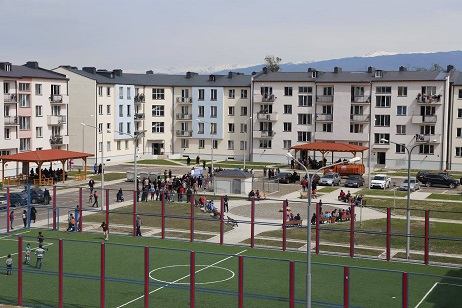302 IDP families who fled Abkhazia gifted new homes

Families who were forced to flee their homes during armed conflict in Abkhazia and relocate to another region of Georgia have been offered new homes.
Today, 320 internally displaced families living in Georgia’s western Samegrelo region were gifted new homes within 10 newly built apartment blocks.
The new living facilities for Internally Displaced Persons (IDPs) were fitted out to meet the needs of people with disabilities. These people received specially adapted apartments on the first floor of the buildings.

This is how Internally Displaced Persons old houses look like.
Families used a unique method to select which apartment they would live in. Earlier, a representative from each family picked out an unmarked envelope which contained details of the apartment they would live in.

Old women who fled her home during armed conflict in Abkhazia and lived in poor conditions.

From today, she will live in this newly build apartment in Zugdidi, Samegrelo region.
This method ensured the apartment selection process was equal between all IDP families and removed the possibility of families accusing authorities of gifting ‘better’ houses to other IDP families.
The 10 apartment buildings were built with funds from Georgia’s Municipal Development Fund with financial support from Germany’s Reconstruction and Development Bank KfW.
The Government-led rehousing project launched on November 1, 2014 and will continue for 10 months, as more houses are offered to additional IDPs.
The majority of the IDPs who were gifted new homes today were living in sub-standard conditions in collective centres.
A 2013 United Nations survey revealed many Georgian IDP collective centres did not meet adequate living standards. To get IDPs into adequate housing, the Georgian Government purchased more than 1,500 houses. These will soon be gifted to eligible families in Georgia’s regional areas.
According to the United Nations Internal Displacement Monitoring Centre (IDMC), there were up to 206,600 IDPs registered by in Georgia at the end of 2013.
About 45 percent of IDP’s lived in collective centres. Of this, the majority of housing (70 percent) did not meet minimum shelter standards, lacked adequate privacy, lacked access to water, proper insulation and functional sewage systems, stated the Gap analysis of the UN Refugee Agency.
 Tweet
Tweet  Share
Share




